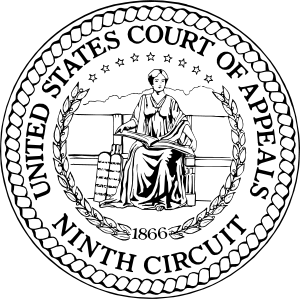The federal appeals court hearing the challenge to California’s Proposition 8 passed on taking another look at the ruling. The decision today by the U.S. Court of Appeals for the Ninth Circuit not to reconsider the appeal, in which a three-judge panel had found the amendment to be unconstitutional in February, starts a 90-day clock for the proponents to decide whether they will ask the Supreme Court to hear the case. [NOTE: They will appeal. See update below.]
“A majority of the panel has voted to deny the petition for rehearing en banc,” the court wrote.
 The proponents of Proposition 8, who are defending the 2008 enactment in court, had requested the en banc rehearing. The court did not give a reason for its decision. Under the court’s rules, a majority of the 26 active judges on the court would have needed to agree to grant the rehearing.
The proponents of Proposition 8, who are defending the 2008 enactment in court, had requested the en banc rehearing. The court did not give a reason for its decision. Under the court’s rules, a majority of the 26 active judges on the court would have needed to agree to grant the rehearing.
[UPDATE @ 6:45P: The attorney for the proponents of Proposition 8, Charles Cooper, tells Metro Weekly, “We do plan to seek Supreme Court review.”
In a statement from the Alliance Defense Fund, which has backed the proponents’ defense of the law, Cooper added, “We’re pleased to petition the Court to hear this case. The lower court opinions were little more than an attack on the character and judgment of millions of Californians, and those decisions essentially ignored all relevant Supreme Court and appellate court precedent. We are hopeful and confident that the Supreme Court will review the 9th Circuit’s decision.”]
Ted Olson, an attorney for the plaintiffs challenging Proposition 8, said of the impact of today’s decision to their challenge to Proposition 8, “We’re not to the end of the line yet, but we’re vastly, vastly closer.”
The court put its decision on hold pending any Supreme Court appeal: “The mandate is stayed for ninety days pending the filing of a petition for writ of certiorari in the Supreme Court. If such a petition is filed, the stay shall continue until final disposition by the Supreme Court.”
Assuming that the proponents will seek Supreme Court review of their appellate loss, they would [The proponents will] file a petition for a writ of certiorari. The plaintiffs and the state defendants — who have opposed Proposition 8’s constitutionality — as well as outside groups and individuals would then be able to file a response to the proponents’ filing.
“We’ll oppose that,” Olson says, of any request by the proponents to seek Supreme Court review.
The Supreme Court, which generally recesses for the summer by late June, would then consider the petition after that briefing is completed, likely once the justices return in the fall. By Supreme Court practice, four of the justices would need to want to hear the case in order for the court to accept it.
If the court accepts review of the case that was brought by the American Foundation for Equal Rights in 2009, then a full briefing schedule and oral argument would be set. If the court denies review, the Ninth Circuit’s decision will stand and Proposition 8 will be unconstitutional — which would enable same-sex couples to marry in California once again.
In a statement, AFER co-founder Chad Griffin said, “Today’s order is yet another federal court victory for loving, committed gay and lesbian couples in California and around the nation. The final chapter of the Proposition 8 case has now begun. Should the United States Supreme Court decide to review the Ninth Circuit’s decision in our case, I am confident that the Justices will stand on the side of fairness and equality.”
The appellate decision striking down Proposition 8 was based upon the reasoning of the Supreme Court in the 1996 case of Romer v. Evans, where the court struck down Colorado’s Amendment 2 as unconstitutional. Amendment 2 had prohibited state and local entities from passing sexual orientation protections. The U.S. Supreme Court struck Colorado’s Amendment 2 down as a violation of the Fourteenth Amendment’s equal protection clause because the amendment’s aim was “not to further a proper legislative end but to make [LGB people] unequal to everyone else.”
In writing the opinion for the Ninth Circuit in the Proposition 8 appeal, Perry v. Brown, Judge Stephen Reinhardt noted, “Proposition 8 is remarkably similar to Amendment 2.”
Reinhardt, joined by Judge Michael Daly Hawkins, concluded that “the People of California may not, consistent with the Federal Constitution, add to their state constitution a provision that has no more practical effect than to strip gays and lesbians of their right to use the official designation that the State and society give to committed relationships ….”
Judge N. Randy Smith had dissented in that decision, and he — along with Judges Diarmuid F. O’Scannlain, Jay Bybee and Carlos Bea — dissented to today’s decision not to reconsider the appeal. Judge O’Scannlain wrote a brief dissent to the decision not to hear the case en banc, in which he was joined by Bybee and Bea.
In part, he wrote, “A few weeks ago, subsequent to oral argument in this case, the President of the United States ignited a media firestorm by announcing that he supports same-sex marriage as a policy matter. Drawing less attention, however, were his comments that the Constitution left this matter to the States and that ‘one of the things that [he]’d like to see is — that [the] conversation continue in a respectful way.'”
“Today our court has silenced any such respectful conversation,” O’Scannlain wrote in dissent.
Judges Reinhardt and Hawkins wrote an brief note concurring in the decision that their original opinion would stand and that they were “puzzled” by O’Scannlain’s dissent.
Today’s decision also means that the expected request by the proponents of Proposition 8 to hear the Perry appeal will be before the Supreme Court for consideration at roughly the same time that any appeal of the cases challenging Section 3 of the Defense of Marriage Act — Gill v. Office of Personnel Management and Massachusetts v. United States — will be before the court for consideration. The First Circuit in Boston, held on May 31 that Section 3 of the DOMA is unconstitutional, relying, in part, on Romer and similar cases that preceded it.
In a conference call with reporters, one of the other attorneys for the plaintiffs, David Boies, said, “The reasoning of both opinions is essentially the same.”
READ the opinion, dissent and concurrence: 11-16577_Documents.pdf
[NOTE: This post was updated and expanded, with the final update at 2:20 p.m., following a conference call AFER held with reporters following the decision.]

 The proponents of Proposition 8, who are defending the 2008 enactment in court, had requested the en banc rehearing. The court did not give a reason for its decision. Under the court’s rules, a majority of
The proponents of Proposition 8, who are defending the 2008 enactment in court, had requested the en banc rehearing. The court did not give a reason for its decision. Under the court’s rules, a majority of 
























